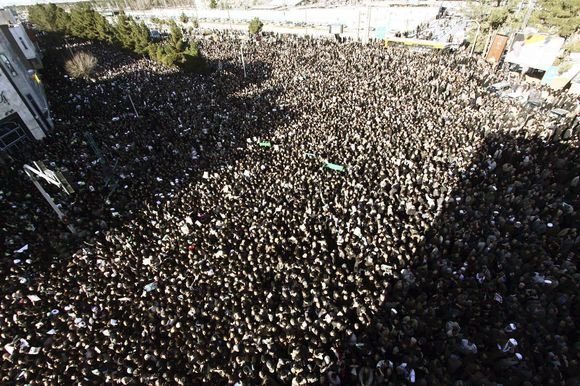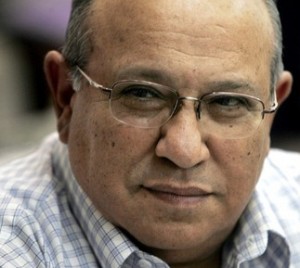Washington can give an Israeli attack on Iran the red light
By Trita Parsi, Huffington Post, November 29, 2009
On August 2, 1990, almost a year after the fall of the Berlin Wall and the end of the Iron Curtain divide, Iraq invaded Kuwait. Within months, the George H. W. Bush administration carefully assembled a coalition of states under the UN flag and defeated the Iraqi army and restored Kuwait’s ruling family, the House of Sabah. The Bush senior administration saw particular value in ensuring that the international coalition contained numerous Arab states. But to get the Arab’s to join a war alongside the US and against another Arab power, Israel needed to be kept out of the coalition.
This turned out to be a tricky issue, particularly when Saddam Hussein hurled thirty-four Scud missiles at Tel Aviv and other Israeli cities, in an obvious attempt to lure Israel into the war. Then-National Security Advisor, General Brent Scowcroft, told me in an interview that the United States told Israel “in the strongest possible words” that it needed to keep itself out of the Iraq operation because Israeli retaliation would cause the collapse of Washington’s alliance against Iraq.
For the government of Prime Minister Yitzhak Shamir, this was a very tough decision. Saddam’s missile attacks damaged Israel’s public morale; the country’s otherwise lively and noisy capital quickly turned into a ghost town. Bush sent Undersecretary of State Lawrence Eagleburger to Israel to assure Israeli leaders that the United States was doing all it could to destroy the Iraqi missile launchers.
But neither the Israel Defense Forces nor the Ministry of Defense was convinced. Instead, a feeling prevailed among Israel’s leaders that Washington was untrustworthy and that it could not be relied upon when it came to Israel’s existence. Bad blood was created between Israel and the United States, according to Efraim Halevi, the former head of the Mossad. Washington’s protection of Israel was ineffective, and the image that Israel was relying on the United States for protection was hard to stomach for ordinary Israelis. Shamir’s decision to accommodate the Americans was extremely unpopular, because it was believed that it “would cause irreparable damage to Israel’s deterrent capabilities,” Halevi told me. To make matters worse, people around Shamir felt that the United States did not reward Israel for, in their view, effectively enabling the coalition to remain intact by refusing to retaliate against Iraq.
Just as Israeli retaliation against Iraq in 1991 would have been devastating for the US, an Israeli preventive attack against Iran today would spell disaster for US national security. [continued…]
A defiant Iran vows to build nuclear plants
By David E Sanger and William J Broad, New York Times, November 30, 2009
Iran angrily refused Sunday to comply with a demand by the United Nations nuclear agency to cease work on a once-secret nuclear fuel enrichment plant, and escalated the confrontation by declaring it would construct 10 more such plants.
The response to the demand came as Iran’s president, Mahmoud Ahmadinejad, said his cabinet would also order a study of what it would take for Iran to further enrich its existing stockpile of nuclear fuel for use in a medical reactor — rather than rely on Russia or another nation, as agreed to in an earlier tentative deal.
On Monday, Russia, a sponsor of the nuclear agency’s resolution, said it was “seriously concerned by the latest statements from the Iranian leadership,” according to news reports. France, which also supported the resolution by the United Nations International Atomic Energy Agency in Vienna last week, said Iran should be given a “last chance” to discuss the future of its nuclear program, Reuters reported. But, referring to the agency by its initials, Foreign Minister Bernard Kouchner said Monday, “The fact that Iran persists in ignoring the demands of a big independent agency like the I.A.E.A., that’s very dangerous.”
The agency’s move also drew criticism from a former Iranian president and still influential politician, Ali Akbar Hashemi Rafsanjani, who said the demand had been made “out of sheer spite,” the state-run broadcaster, Press TV, said Monday. “This resolution targets the entire panoply of Iran’s feats and accomplishments in nuclear research and technology,” he said, urging that Iran respond with “active diplomacy on the international scale.” [continued…]
Iran seizes five British sailors to raise stakes in stand-off with West
By Catherine Philp and Ed Gorman, The Times, December 1, 2009
Diplomatic tension between Britain and Iran deepened yesterday with the news that Tehran is holding five British sailors after their yacht apparently strayed into Iranian waters.
The Foreign and Commonwealth Office said that the crew members were taken from their yacht Kingdom of Bahrain on November 25 after she was stopped by Iranian naval vessels while sailing from Bahrain to Dubai.
Sources named the five Britons as Oliver Smith, 31, an experienced sailor from Southampton, as well as Sam Usher, Oliver Young, 21, from Saltash in Cornwall, Luke Porter, 21, from Weston-super-Mare and Dave Bloomer, a presenter on Radio Bahrain. Mr Porter is reported to have spoken to his father Charles yesterday. [continued…]
Senior cleric denounces Iranian militia for crackdown
By Nazila Fathi, New York Times, December 1, 2009
Iran’s most senior cleric denounced the role of the volunteer militia force known as the Basij in the crackdown against protesters, saying the force’s actions were against religion and “in the path of Satan.”
The cleric, Grand Ayatollah Hossein Ali Montazeri, condemned the force in a statement posted on an opposition Web site, mowjcamp.com, decreeing that “the assailants have acted against religion and must pay blood money” to those who were wounded or to their families.
It was the harshest criticism of the militia to date by the ayatollah, who has sided with the opposition leaders. The Basij militia has played an instrumental role in the crackdown; the opposition has said that at least 73 people have been killed since the post-election protests began in June. [continued…]


 ven among Israel’s tough security chiefs, Meir Dagan has always been known for his raw nerve. As a military trainee he would wander around the base during his off hours flinging a knife at trees and telephone poles like a circus entertainer, one fellow soldier recalls. He earned one of his first decorations as a young commando in Gaza, for snatching a live grenade from the hands of an enemy fighter. Long-haired and confident, Dagan would sometimes bring his pet Doberman, Paco, along on raids. His propensity for solving problems by force continued even after he retired from the military. He was leading a task force on terrorist financing in 2001 when his men told him they had discovered a European bank being used to channel money from Iran to Hamas. “We have the address, no?” Dagan asked his intel officers, according to a participant in the meeting, who asked not to be named for fear of angering Dagan. “Burn it down!” The horrified intelligence officers stalked out of the room in protest. (Dagan declined any comment for this story.)
ven among Israel’s tough security chiefs, Meir Dagan has always been known for his raw nerve. As a military trainee he would wander around the base during his off hours flinging a knife at trees and telephone poles like a circus entertainer, one fellow soldier recalls. He earned one of his first decorations as a young commando in Gaza, for snatching a live grenade from the hands of an enemy fighter. Long-haired and confident, Dagan would sometimes bring his pet Doberman, Paco, along on raids. His propensity for solving problems by force continued even after he retired from the military. He was leading a task force on terrorist financing in 2001 when his men told him they had discovered a European bank being used to channel money from Iran to Hamas. “We have the address, no?” Dagan asked his intel officers, according to a participant in the meeting, who asked not to be named for fear of angering Dagan. “Burn it down!” The horrified intelligence officers stalked out of the room in protest. (Dagan declined any comment for this story.)